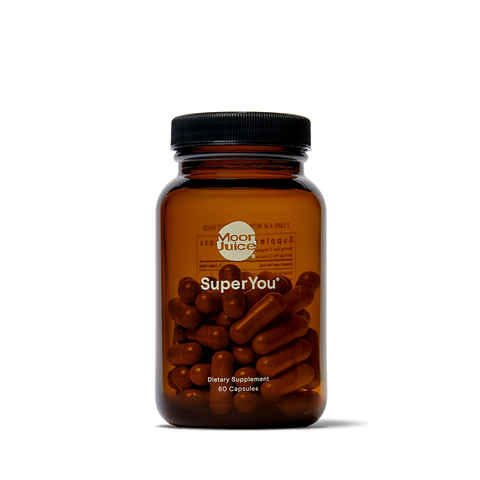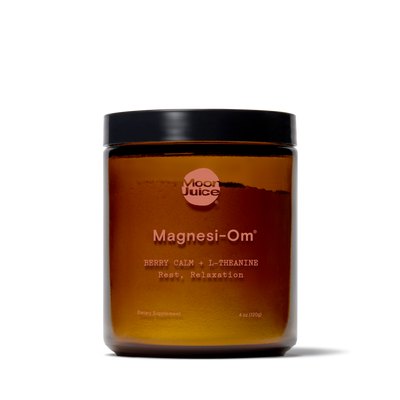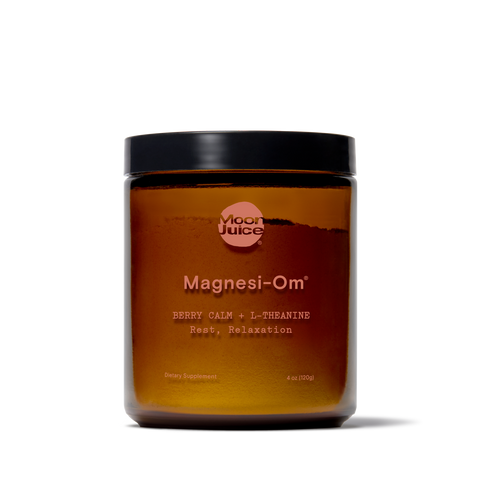It’s no surprise that in our extremely busy lives, stress has become a part of our everyday. Not only is it in our demanding jobs, family responsibilities, and packed social schedules — it also comes externally, like pollutants in the air, the amount of noise we experience, and even artificial light. Over time, the accumulation of all those stressors can lead to a slew of health imbalances from digestion to hormones to skin and hair.
This is why it’s imperative to find ways to reduce your stress levels (including ways to reduce stress levels naturally) on a daily basis — even if it’s through a small daily routine, like taking a supplement. There are several vitamins, supplements, and herbs that have been proven to help reduce stress, and they’re easy to take every single day. These vitamins for stress can help everything from mood and gut health and digestion to stress belly and even improving hair growth.
What is stress?
Essentially, stress can be defined as any type of change that causes physical, emotional, or psychological strain on the body and mind, and it can be a response to a perceived “stressor” in one’s life. This activates the body’s fight or flight response: i.e, what causes the stress hormones cortisol and adrenaline to flood the body, leading to speeding heart rate, slower digestion, and a burst of energy that’ll later lead to a crash. Back in the day, that stressor was, say, a lion or a drought, so it made sense for the body to react in the way it did. However, now, the body reacts the exact same way to being late that it does to that lion, and constantly being in that cycle can harm your nervous system and make it unable to fight real threats later on.
What are the signs of chronic stress?
If you think you’re chronically stressed, you likely are: Stress can leave you feeling irritable, foggy, and cranky on the daily. But if left untreated, stress can also show up as missed periods, backaches, insomnia, muscle pain or tension, a weakened immune system, and even memory loss. High levels of stress can affect hormone function and brain health, too, so getting your stress in order as soon as you can will help in the long run.
If left untreated, stress can also show up as missed periods, backaches, insomnia, muscle pain or tension, a weakened immune system, and even memory loss.
How can you best beat stress?
Chronic stress isn’t something you have to live with forever. While you can’t fully eliminate stress from your life, there are a few easy tactics you can incorporate into your day-to-day that’ll help you become more resilient, like stretching, taking brisk walks, and meditating. But once you’re in the midst of a stressful situation, it can be hard to remember to incorporate these things. That’s why a daily routine of taking vitamins for stress can help buffer the way your body reacts to stressors, making it easier for you to return to a place of calm.
The Six Best Vitamins for Stress
1. Magnesium
Magnesium is a wonderful mineral for stress because it works through the HPA-Axis (an integral pathway to maintain homeostasis in the body) by calming it down. Almost 50 percent of people in the United States unfortunately don’t get enough Magnesium through diet alone, which is why supplementing it is absolutely key. Essentially, when the body is stressed, it pushes Magnesium out of the cells for protection and regulation. Cells with high concentrations of Magnesium can more easily regulate the stress response and enhance feelings of relaxation.This is because Magnesium binds to the brain’s GABA receptors (that keep us alert), calming the body down and transporting us to a more restful state. Magnesium supplements are great additions to your supplement routine.
2. Ashwagandha
Ashwagandha is an adaptogenic herb that has been proven to help fight the effects of stress. This mood boosting adaptogen also works through the HPA-Axis, and it has been used heavily over the years in Ayurvedic culture to help fight the effects of cortisol in the body. Ashwagandha root extract nourishes both the adrenal and thyroid systems to tame anxiety, renew vigor, and restore centeredness. It helps support mood, sleep, memory, the immune system, and has anti-inflammatory properties. Ashwagandha can help everything from irritability to mood swings: In fact, a 2019 study found that those who took Ashwagandha regularly experienced a deep dip in stress levels, and also slept better.
A 2019 study found that those who took Ashwagandha regularly experienced a deep dip in stress levels, and also slept better.
3. L-Theanine
L-Theanine is an amino acid that works by slowing down the neurotransmitters that make you feel stressed. It’s been found that regular consumption of L-Theanine relaxes the body and even helps improve sleep, reducing stress levels on a daily basis. It helps get the body ready for sleep when taken at night.
4. Rhodiola
Rhodiola root has long been used in traditional medicine to help promote concentration and reduce fatigue. Continued use of Rhodiola root powder increases your body’s natural resistance to stress, allowing you to do more in a calm state. This hardy plant is traditionally used to sustain endurance, fight fatigue, and increase cardiovascular function and lung capacity, while also easing stress and lifting mood.
5. Shatavari
A member of the asparagus family grown throughout Nepal, India, and Sri Lanka, Shatavari is a hormone root adaptogen that has traditionally been used in Ayurveda to support hormonal health throughout each stage of life, from menstruation to menopause. A 2018 study also found that Shatavari can be very beneficial for those with high stress levels, as it helps modulate cortisol levels in the body. It also increases the production of ‘happy hormones’ like serotonin and dopamine, thereby reducing irritability, too.
6. Amla
Basically, Amla (or Indian Gooseberry) is one of the greatest protectors for the skin: It helps protect skin from oxidative stress and accelerated aging by ensuring that the body can fight stress and fatigue effectively. Our organic amla powder is also incredibly rich in antioxidants essential for skin health.
There are several vitamins that can help to reduce stress including vitamin A, B complex vitamins such as vitamin B5, vitamin B6, vitamin B12, vitamin C, vitamin D, vitamin D3, and vitamin E in addition to the supplements above. Knowing which vitamin to supplement from b12 vs b complex to a multivitamin supplement can help you manage your stress hormone levels.
2 Ways to Unstress
When it comes to supplementing with adaptogens and nutrients, one of the most important things you can do to feel a true difference is to take them daily. Great change comes with consistency, but it can be overwhelming finding the right balance of herbs and supplements for you—and then, remembering to take each of them daily.
The Unstress Stack, however, is an easy way to get started. SuperYou in the AM and Magnesi-Om in the PM mitigate stress chemistry for energy, mood, relaxation, and brain health. When used daily, you’re getting a dose of all 6 adaptogens and nutrients mentioned above!
SuperYou® is your daily stress management. It’s a clinical strength blend of 4 potent adaptogens — Ashwagandha, Rhodiola, Shatavari, and Amla — that help promote the body's ability to cope with stress and recover from it.*.
Magnesi-Om® is your pink nightcap. 3 bioavailable forms of Magnesium (Gluconate, Acetyl Taurinate, Citrate) and L-Theanine to help restore cellular balance for relaxation, sleep, brain health, and regularity.*
The Unstress Stack is the ultimate ritual for keeping stress in check with our best stress relieving supplements: 2 caps SuperYou® in the AM, and 1 tsp Magnesi-Om® in the PM.
Sign Up, Nerd Out
Get wellness tips, education, and recipes
delivered straight to your inbox.
Get wellness tips, education,
and recipes delivered
straight to your inbox.
Sources
- National Library of Medicine, STRESS AND HEALTH: Psychological, Behavioral, and Biological Determinants https://www.ncbi.nlm.nih.gov/pmc/articles/PMC2568977/
- Cellular and Molecular Neurobiology, Adrenal Responses to Stress https://link.springer.com/article/10.1007/s10571-010-9606-9
- National Library of Medicine, The impact of stress on body function: A review https://www.ncbi.nlm.nih.gov/pmc/articles/PMC5579396/
- Harvard Health Publishing, Top ways to reduce daily stress https://www.health.harvard.edu/staying-healthy/top-ways-to-reduce-daily-stress
- National Library of Medicine, Suboptimal magnesium status in the United States: are the health consequences underestimated? https://pubmed.ncbi.nlm.nih.gov/22364157/
- National Library of Medicine, Magnesium Status and Stress: The Vicious Circle Concept Revisited https://www.ncbi.nlm.nih.gov/pmc/articles/PMC7761127/
- National Library of Medicine, Adaptogenic and Anxiolytic Effects of Ashwagandha Root Extract in Healthy Adults: A Double-blind, Randomized, Placebo-controlled Clinical Study https://www.ncbi.nlm.nih.gov/pmc/articles/PMC6979308/
- National Library of Medicine, Effects of L-Theanine Administration on Stress-Related Symptoms and Cognitive Functions in Healthy Adults: A Randomized Controlled Trial https://www.ncbi.nlm.nih.gov/pmc/articles/PMC6836118/
- National Library of Medicine, Rhodiola rosea L.: an herb with anti-stress, anti-aging, and immunostimulating properties for cancer chemoprevention https://www.ncbi.nlm.nih.gov/pmc/articles/PMC6208354/
- National Library of Medicine, Impact of stress on female reproductive health disorders: Possible beneficial effects of shatavari (Asparagus racemosus) https://pubmed.ncbi.nlm.nih.gov/29635127/
- National Library of Medicine, Functional and Nutraceutical Significance of Amla (Phyllanthus emblica L.): A Review https://www.ncbi.nlm.nih.gov/pmc/articles/PMC9137578/

















